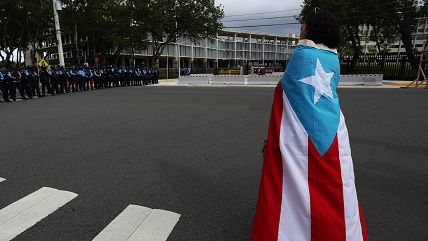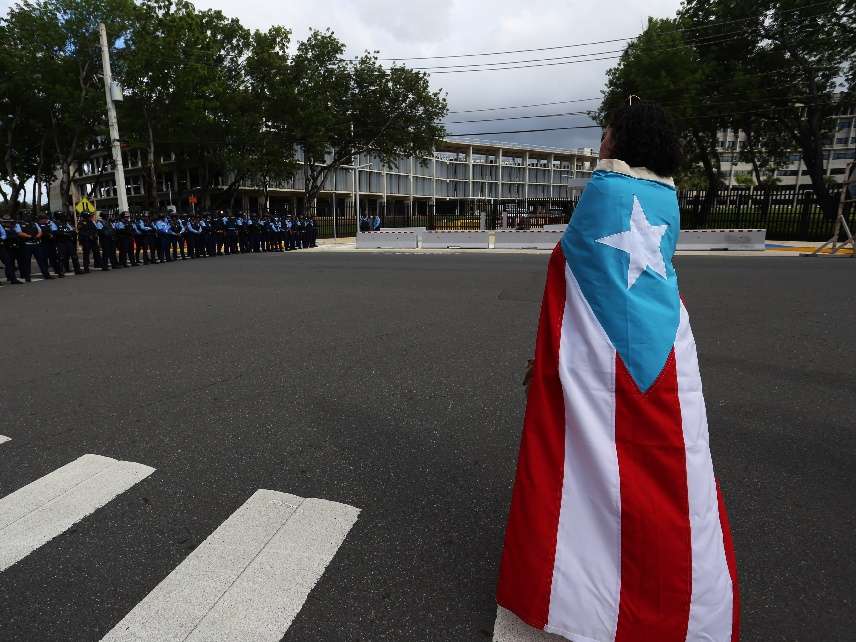Puerto Ricans Choose Statehood, But They Need to Choose Capitalism, Too
Free market principles are more important to Puerto Rico than becoming the 51st state.


Voters in Puerto Rico overwhelmingly chose statehood in a non-binding referendum on Sunday.
Yet statehood, or independence for that matter, is not a panacea for Puerto Rico's fiscal troubles—the island has been mired in a debt crisis for years and some supporters of statehood point to the inevitable bailout that would accompany accession, according to Frank Worley, a co-founder of the Puerto Rican Libertarian Party.
"Let me be absolutely clear, Puerto Rico's economic woes begin and end in Puerto Rico," Worley says. "The near religious devotion to big government policies, high taxes, public sector unions and expansive regulation are the primary forces driving Puerto Rico's economic and debt crisis. The biggest appeal of statehood is the increase in federal spending on the island that would in essence kick-start the economy."
Roughly 23 percent of registered voters, about 500,000 of a total of 2.2 million cast ballots. Statehood captured 97 percent of that vote—independence won 1.51 percent of the vote, and 1.32 percent voted for the current status.
Maintaining the current status was not originally an option in the plebiscite, but was added at the request of the US Department of Justice.
The two major parties on the island, the pro-commonwealth Popular Democratic Party (PDP) and the Puerto Rico Independence Party (PIP) boycotted the plebicite. The PDP tried to spin the results as a loss for statehood, which was supported by the ruling New Progressive Party (NPP) and the NPP governor of Puerto Rico, Ricardo Rosselló.
"The collective well-being surpasses individual interests and the country understood that," Hector Ferrer, the president of the PDP, said. "Eight out of 10 voters responded to the boycott. The boycott defeated statehood today. Time has proven us right. The greatly defeated today, besides statehood, is Ricardo Rosselló," Ferrer said.
Worley, a founder of the pro-independence Republican Independence Movement (MIRE), doesn't buy that framing.
"The boycott from the other parties should take nothing from the results," Worley tells reason. "Consider the mid-term congressional elections, no member of Congress has ever stepped down due to low turnout in the midterms. That will be the strongest argument the [ruling New Progressive Party] NPP will have. They will push forward; elections have consequences."
Rosselló indicated if the plebiscite passed the government would follow the "Tennessee plan," sending a delegation to Congress and trying to force the body to recognize statehood.
"Statehood offers the most practical civil rights guarantee and long term access to U.S. markets and thus world markets by virtue of being a permanent part of the U.S," Worley says. "It also fulfills the most egregious shortcoming of any territorial status: lack of voting rights. The 3.5 million people in Puerto Rico cannot vote for president and have only one non-voting member of congress to represent them."
"However, neither that nor a change in status to any option will solve the economic crisis until the island fundamentally changes the way it does business, attacks corruption and limits government interference with the marketplace," Worley says. "It is extremely difficult to fire employees in Puerto Rico and benefits are expensive. If I were planning to open a business, I would not open it in Puerto Rico."
The pro-independence PIP also rejected the results of the plebiscite after calling for a boycott.
"I was genuinely disappointed with the decision by the pro-independence side to boycott this vote," Worley says. " I've long argued PIP doesn't really want independence since they seem to have done everything they can to thwart their own efforts."
Worley argues independence is the best option for American taxpayers, which he says are often ignored in the debate.
"The question that is never asked is 'which option would be best for the United States and the U.S. taxpayer?" he says. "The answer to that question is a well thought out plan for independence. Even if the U.S. agreed to refinance or renegotiate Puerto Rico's debt and agreed to make massive investments in infrastructure (which are desperately needed) the long term cost of independence would be lower to the U.S taxpayer than statehood."
MIRE has just such a plan, featuring "limited republican government with four branches of government executive, legislative, judicial and a governing board." The board would provide direct oversight of the other branches and manage a national investment trust fund, loosely based on the Alaska Permanent Fund or the federal Thrift Savings Plan. The moeny for the funs would come in part from vice taxes imposed after the legalization of drugs and sex work.
"We are a very small group," Worley says. "The majority of independence supporters are socialists while I am a capitalist."


Show Comments (95)